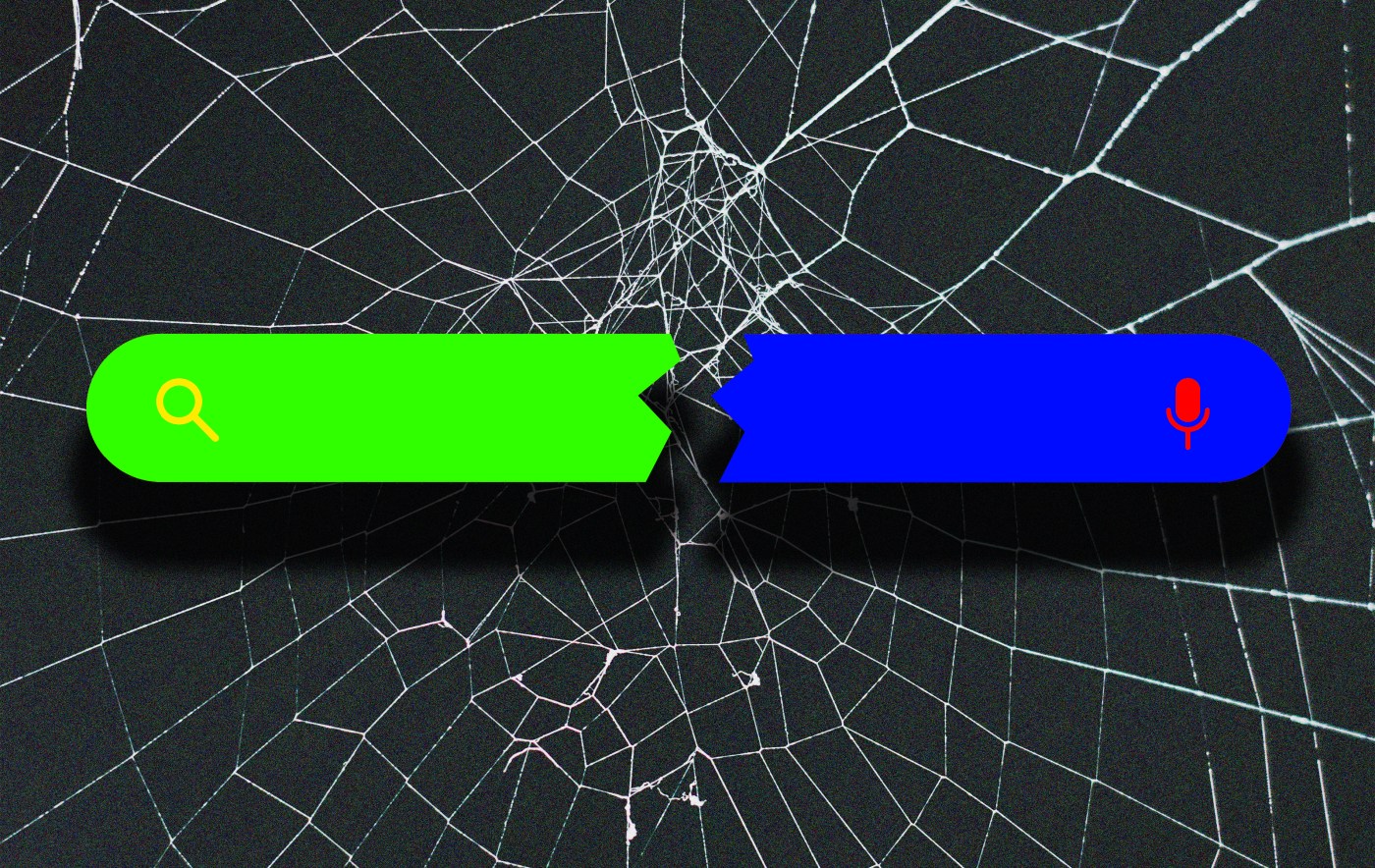In 1914, IBM introduced a simple one-word slogan for its company: THINK. Then in 1997, Apple offered a refined version of the same motto that challenged norms and revitalized a moribund company: Think Different. Now, in 2025, if one were to look for a catchy, industry-redefining slogan worthy of tech behemoth Google, one might struggle to find a better one than Let AI Do the Thinking for You.
In May, Google CEO Sundar Pichai delivered the keynote address at Google’s annual I/O developer conference, where he emphasized the rapid progress his company has made on the AI front.
Flanked by impressive display screens and slickly produced videos, Pichai introduced yet another improvement to its search engine: AI Mode, which promises an interactive, AI-boosted experience much like OpenAI’s ChatGPT. Google says users can now expect detailed, personal answers to their queries (“how to make the perfect brownie”) and expect them almost instantaneously. Research shows that 50 percent of users click on their preferred search results within nine seconds, but Google's AI Mode provides information directly, meaning one might not need to to click on any links at all.
While it’s possible to get basic information more quickly than ever, some users have expressed dismay at the effects of Google’s changes, pointing to low-quality results that have replaced more useful information. Google Search, and its AI Overview function, both direct users to Reddit, blogs, and other user-generated sites at the expense of platforms that offer more general content—like legacy news sites.
Google Search has never been a static product, but the introduction of AI has fundamentally changed the experience of online searches.
How do Google searches work?
With a 90 percent market share, Google Search is the world’s default search engine, handling almost 8.5 billion daily queries. Yet even experts know very little about its mechanics and what’s really under the hood. Barry Schwartz, the CEO of web development company RustyBrick, told The Dispatch he has written “over 40,000 stories on how Google works over the past 25 years.” In other words, apparently even he still hasn’t figured it out. Google itself offers an in-depth guide to its search operation, but there is still a great deal that remains hidden from view. In short, there are three stages to Google search: crawling, indexing, and serving search results.
First, Google dispatches its web-crawlers—computer programs that follow links from web page to web page—to locate content for Google’s index. These crawlers are constantly scanning the web for new pages, a demanding task as more and more content is generated by the second. After crawling and discovering new content, Google search indexes this information, determining the contents and origin of a page. Google has to be able to distinguish between, say, a recipe for chocolate cake and a breaking news development that happens to contain the words “chocolate” and “cake,” between a “canonical,” or original web page, and a duplicate. At this point, Google’s algorithm begins compiling its search result rankings, which are based on relevance, quality, and reputation.
In plain English, Google’s algorithm seeks out web pages that will give users helpful, authoritative, and expert answers to their queries, ranking those pages highest. Today, however, many users suspect that Google’s recent emphasis on user experience has come at the expense of trustworthiness and expertise.
Google’s favorites have an advantage over their competition because people almost always click on the first few websites that Google lists. In fact, only 9 percent of users even scroll to the bottom of the first results page. If users don’t find what they’re looking for immediately, they usually will refine their search parameters rather than clicking through to the next page.
AI Mode will theoretically abolish the need to even refine search terms. AI Mode users are just “reading the response and not clicking over,” Schwartz said, and that’s the big change.
How has Google search changed recently?
AI Mode is just the latest way in which Google Search has changed. Indeed, Google constantly tweaks and updates its algorithm, with its eye toward enhancing the user experience. Web designers and search engine optimization (SEO) experts say these core updates set off a feeding frenzy among publishers as each tries to rise to the top of Google search results.
The 2016 election cycle was a watershed moment in Google Search’s recent history. As fears of an online Russian disinformation campaign ran rampant, Google moved to clarify its stance on disinformation and spam. In August 2018, Google moved to a new standard for evaluating websites for quality: EAT, or expertise, authoritativeness, and trustworthiness. Google search results were no longer going to be a cesspool of quackery, personal blogs, and conspiracy theorizing.
SEO experts dubbed the 2018 search overhaul the “medic” update because of its emphasis on websites like medical journals or financial platforms that adhere to rigorous quality standards. According to SEO analysts at the digital marketing agency Amsive, the Food and Drug Administration and the Centers for Disease Control and Prevention were the biggest winners in 2020, experiencing a tremendous boost in search results amid the COVID pandemic.
Some SEO experts, like Amsive’s Lily Ray, remember this post-2018 moment as a new golden age for the internet. Google cleaned up its proverbial streets, ridding itself of spam links and boosting long-form content. When people today reminisce about the “good old days” of Google, they generally mean 2015 to 2022.
In 2022, Google added another E to its ratings acronym, adding “experience” to the mix. Since then, Google has considered user experience to be as important as expertise and authoritativeness. A Google spokesperson told The Dispatch via email that feedback has shown that people want search results to reflect the experiences of other users. Google now values content produced by an author who has had direct experience with a particular subject over content obtained secondhand.
As a result of Google Search’s increased focus on user experience, Similarweb reports that all mainstream news outlets have suffered a massive year-over-year decline in traffic referrals from Google between May 2024 and May 2025. CNN fell 27.9 percent, Fox News dropped 23.9 percent, and the New York Post is down 27 percent.
Some blame AI Mode for destroying the legacy media’s online presence, while others argue that the decline in web referrals dates back to 2022, when Google began prioritizing experience. Either way, the data are clear: News sites are not seeing as much traffic as they used to. Users are opting to get their news and information from Google’s AI Overviews, while relying on websites for products or advice.
For people like SEO consultant Edward Sturm who make their living helping businesses boost their Google rankings, this has profound implications for the future of web design and marketing. Sturm told The Dispatch people seek practical, actionable information on the internet, not general content, so AI summaries are quickly replacing information websites. Sites “making informational content, and especially if [they] do not have a unique perspective, are going to hurt,” he said.
Faced with the loss of revenue-driving traffic to websites, an industry group representing newspaper and magazine publishers has criticized Google’s new practice of replacing traditional links with a chatbot. Web publishers accuse Google of essentially stealing content and repackaging it for AI Mode summaries.
Eugene Levin, president of the digital marketing agency Semrush, told The Dispatch via email this phenomenon is not unique to Google “and that platforms like Reddit have dominated citations across all AI search tools.” Experts like Schwartz argue that Reddit’s popularity is a reflection of user preference, providing a human element that impersonal articles cannot. In many cases, this is more useful than traditional webpages.
If you have an issue with your car, someone, somewhere in the Redditverse has probably suffered a similar inconvenience and perhaps arrived at a solution not mentioned in the owner’s manual. Google and its large language models are betting on the Reddit format, gambling that people today prefer this experience-oriented method of information gathering. For its part, Google says it’s catering to the modern consumer—making search easier and more convenient. It’s now possible to ask our questions by searching with your camera, circling what’s on your screen, or just humming a tune, a Google spokesperson told The Dispatch via email.
AI Mode vs. Search.
Levin notes that AI Mode offers the user a “fundamentally different experience than traditional search.” Studies show that just half of AI Mode’s citations match the top 10 results in traditional search. In theory, this allows for more open-ended exploration as users can endlessly prompt the AI while traditional search expects the user to know what they are looking for.
Sarah Gray, senior vice president of marketing at Amsive, explains that over time users have changed how they use Google Search. Back in the old days, “one of the most common ways that people put keywords into their search bar in Google was ‘something, something’ near me,” Gray said. In other words, one had to prompt Google into providing them geographically relevant search results. Today, Google’s AI Mode automatically filters its results for us, selecting for the nearest accessible bar, shoe store, restaurant, hair salon, or tandem skydiving destination.
However, Google’s updates aren’t quite working as advertised. Commentators have noticed a degradation in the quality of search results, with Google boosting more sponsored content than previously. If a user looks for a high-quality blender, for example, all of the top search results are sponsored—that is, they are from companies that paid Google for their choice spot on the results page. In 2023, $175 billion of Google’s $307.39 billion in revenue came from search ads alone.
At the same time, Google has made it increasingly difficult to answer even basic questions. This can manifest itself in the form of 3,000-word blog posts about how to scramble an egg or cook a steak. And it’s not just recipes. Searching “how many people are there on Earth?” produces the wrong answer, 8.062 billion, based on outdated data from the World Bank. That would have been correct two years ago. According to Worldometer, the global population in 2025 is 8.231 billion.
In an interview last month with The Verge, Pichai sketched out a rosy vision for both Google and the modern web. To hear him tell it, AI tools, like AI Mode for search, will help internet users make sense of the expanding internet, produce better content, and create a personalized web for every user. But with AI leaders such as OpenAI looking to challenge Google’s search dominance with ChatGPT and planning to release a web browser to compete with Chrome, Google may go from being a verb to being just another way to search.






Please note that we at The Dispatch hold ourselves, our work, and our commenters to a higher standard than other places on the internet. We welcome comments that foster genuine debate or discussion—including comments critical of us or our work—but responses that include ad hominem attacks on fellow Dispatch members or are intended to stoke fear and anger may be moderated.
With your membership, you only have the ability to comment on The Morning Dispatch articles. Consider upgrading to join the conversation everywhere.